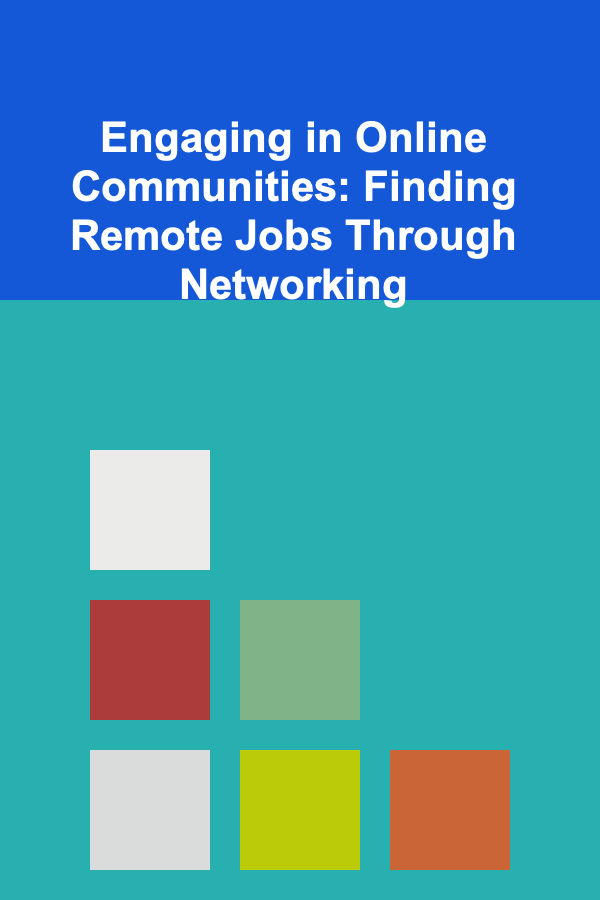
Engaging in Online Communities: Finding Remote Jobs Through Networking
ebook include PDF & Audio bundle (Micro Guide)
$12.99$11.99
Limited Time Offer! Order within the next:

The world of remote work has evolved dramatically in recent years. Once considered a niche career option, remote work has now become mainstream. As more companies embrace the flexibility of remote teams, the pool of opportunities for remote workers continues to grow. However, securing a remote job isn't always straightforward. While job boards and company websites are common places to find listings, one of the most effective strategies is engaging in online communities. These communities are hubs of knowledge, connections, and job leads, where networking can open doors to remote job opportunities you may not find anywhere else.
This actionable guide will walk you through how to use online communities to your advantage in your search for remote work. We'll discuss how to identify the right communities, how to build genuine relationships, and how to leverage those networks to land your dream remote job.
Why Online Communities are a Goldmine for Remote Job Seekers
Online communities are uniquely suited to remote job seekers for several reasons:
- Access to a Wide Range of Opportunities: Remote job postings are often shared in niche online communities, such as forums, Slack groups, or specialized Facebook groups. These platforms tend to feature job openings that aren't always posted on traditional job boards.
- Networking with Like-minded Professionals: Communities provide an opportunity to connect with others who share your career interests and goals. These relationships can lead to referrals, introductions, and insider knowledge about job openings.
- Support and Motivation: Searching for remote work can feel isolating, and online communities offer a space to share experiences, challenges, and successes. This sense of camaraderie can boost your motivation and help you stay focused on your goals.
- Learning and Skill Development: Many online communities host webinars, courses, and discussions about trends in remote work. By engaging in these educational opportunities, you can sharpen your skills and stay up-to-date with the latest industry trends.
How to Find the Right Online Communities for Remote Jobs
Not all online communities are created equal. To ensure that you're engaging in the right spaces, it's important to identify communities that cater to remote work opportunities and the field you're interested in.
1. Start with Job-Specific Communities
Many online platforms are dedicated specifically to remote work, which is a great place to start. Here are some platforms to consider:
- Remote-First Companies' Communities: Some companies have their own communities where they post job opportunities, host events, and engage with prospective candidates. Look for Slack groups, Discord channels, or private Facebook groups associated with companies that have remote-first policies.
- Dedicated Remote Job Boards: Websites like We Work Remotely, Remote OK, and FlexJobs are great starting points, but many of these also have their own communities or forums where members can exchange ideas and share job leads.
- Specialized Industry Groups: Look for online communities that cater specifically to your field of expertise. For instance, if you're in tech, platforms like GitHub or Stack Overflow have active communities where developers often share remote opportunities. Designers might consider joining Dribbble or Behance communities, which also offer job postings and collaboration opportunities.
2. Join Social Media Groups
Social media platforms offer a variety of groups and forums tailored to remote job seekers. These groups can be a goldmine for networking and job postings.
- Facebook: There are numerous groups dedicated to remote work on Facebook. Simply search for "remote jobs" along with your specific industry (e.g., "remote marketing jobs") to find groups where people post job leads, share advice, and offer support.
- LinkedIn Groups: LinkedIn groups are another powerful way to connect with professionals who are working remotely or looking for remote work. Participate in discussions, share your expertise, and follow job posts that may not appear in the standard job listings.
- Reddit: Subreddits such as r/remotejobs, r/WorkOnline, and r/freelance are filled with people sharing remote job opportunities and advice. Active participation in these communities can help you stay on top of the latest job listings and connect with others in your industry.
3. Explore Slack and Discord Communities
Slack and Discord are two platforms where online communities thrive, especially within tech, marketing, design, and other professional industries. Many Slack and Discord communities offer spaces for job seekers to engage with hiring companies and individuals who are hiring for remote positions.
- Slack Communities : Look for remote work-focused Slack communities like #remotejobs or #job-board. Many of these communities are tailored to professionals from specific fields like product management, software development, marketing, or design. A few well-known Slack communities include Tech Talent and Remote Work Hub.
- Discord Communities : Discord is a platform that initially gained popularity with gamers but has since expanded to many professional communities. Search for remote work-focused servers (like Work From Home or Digital Nomads) to find job listings, opportunities, and networking events in real-time.
How to Build Genuine Relationships in Online Communities
Simply joining a community isn't enough; you need to engage meaningfully and build relationships with other members. Here's how to do that:
1. Contribute to Discussions
Become an active participant by contributing to ongoing conversations. Share your insights, offer advice, or ask questions that show you're engaged and genuinely interested in learning. By providing value to others, you can build a positive reputation within the community, making people more likely to help you when it's time for your job search.
2. Network, Don't Just Look for Jobs
While it's tempting to focus solely on finding job postings, online communities are also about making connections. Instead of only asking about job opportunities, take the time to reach out to others, build relationships, and get to know them. Ask people about their career paths, challenges they've faced, and their experience working remotely. Establish a rapport with others in your field, and they may be more inclined to recommend you when a job opportunity comes up.
3. Be Consistent and Reliable
Consistency is key to building relationships online. If you're only engaging sporadically, your presence may not be as noticeable. Dedicate some time each week to interacting with the community, whether that's responding to job postings, participating in discussions, or offering your expertise. Being a reliable and consistent presence in the community will help you establish trust with others, which can eventually lead to job opportunities.
4. Follow Up and Stay in Touch
After making a connection, follow up with the people you meet. Whether it's through direct messaging, email, or continued conversations in the community, staying in touch will help you nurture those relationships. Let people know how their advice or help has impacted you, and offer to help in return when you can. Long-term relationships are built on mutual respect and support.
How to Leverage Networking for Remote Job Opportunities
Networking is an essential aspect of finding remote jobs, especially in tight-knit online communities. Here's how you can leverage the relationships you've built to find job leads:
1. Ask for Referrals
Once you've built meaningful relationships, don't be afraid to ask for referrals. Many remote companies value recommendations from within their own networks. If you've been active in a community and have proven yourself as a valuable member, others might be more willing to refer you to job openings or hiring managers.
2. Engage with Recruiters
Recruiters often hang out in online communities looking for top talent. If you come across a recruiter in one of the communities, reach out and make sure they know about your background and expertise. Engage in casual conversations and let them know you're looking for remote work. Building these relationships can help you secure interviews with companies that are hiring.
3. Participate in Virtual Job Fairs and Webinars
Many communities host virtual job fairs, webinars, or networking events where employers directly interact with job seekers. These events are great opportunities to connect with recruiters, ask questions about available positions, and showcase your skills. Be proactive in attending and engaging in these events to maximize your chances of finding a remote job.
4. Showcase Your Skills and Portfolio
If you're a freelancer or have a portfolio, share it within relevant online communities. For example, if you're a web designer or developer, showcasing your work in a Discord or Slack group may catch the eye of someone looking to hire. Don't be shy about highlighting your skills in discussions or offering advice on topics within your expertise.
Conclusion
Engaging in online communities is one of the most powerful ways to find remote job opportunities. By joining the right communities, building genuine relationships, and leveraging your network, you can access job leads that may not be available on traditional job boards. Networking within these communities provides not just job opportunities, but also support, knowledge-sharing, and long-term professional relationships that can help you thrive in the remote work landscape.
Remember, remote job searching is as much about who you know as what you know. So, engage meaningfully, contribute value, and don't be afraid to ask for help---your next remote job could be just one connection away.
Reading More From Our Other Websites
- [Needle Felting Tip 101] How to Incorporate Botanical Elements into Needle‑Felted Arrangements for Botanical Illustration Projects
- [Trail Running Tip 101] Best Trail‑Running Techniques for Efficient Running on Uneven Surfaces
- [Organization Tip 101] Common Signs That Indicate It's Time to Replace Your Chimney Cap
- [Gardening 101] Step‑by‑Step Guide: Building a Sturdy Wooden Trellis for Flowers & Vines
- [Sewing Tip 101] Sewing Savings Checklist: Must-Have Supplies That Won't Break the Bank
- [Hiking with Kids Tip 101] Kid‑Friendly Hiking Gear: Mastering the Three‑Layer System for Outdoor Adventures
- [Gardening 101] The Best Plants and Decorations for Your Fairy Garden
- [Organization Tip 101] DIY Plumbing: Simple Repairs You Can Do Yourself
- [Organization Tip 101] How to Establish a Routine for Regular Decluttering
- [Personal Financial Planning 101] How to Build an Emergency Fund to Prepare for Financial Uncertainty

How to Make Your Home Look Bigger with Budget Decorating Tips
Read More
How to Mix Old and New Items for a Budget-Friendly Decor Look
Read More
How to Understand the Privacy Implications of AI Assistants
Read More
Photographing Planetary Conjunctions: A Comprehensive Guide
Read More
How to Budget for a Major Purchase
Read More
10 Tips for Visualizing Inspirational Quotes Effectively
Read MoreOther Products

How to Make Your Home Look Bigger with Budget Decorating Tips
Read More
How to Mix Old and New Items for a Budget-Friendly Decor Look
Read More
How to Understand the Privacy Implications of AI Assistants
Read More
Photographing Planetary Conjunctions: A Comprehensive Guide
Read More
How to Budget for a Major Purchase
Read More